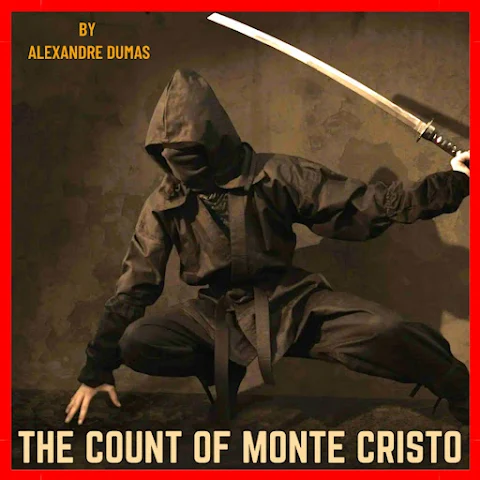The Classic Tale That Never Fades
The Count of Monte Cristo, originally a novel by Alexandre Dumas, was adapted into a gripping 1995 mini-series directed by Josée Dayan. Starring Gérard Depardieu as Edmond Dantès, this version masterfully captures the novel’s essence. It’s a timeless story of betrayal, vengeance, and ultimately, redemption. If you’re a fan of drama, intrigue, and larger-than-life characters, this is for you!
Want to Experience the Story Right Now?
Listen on SpotifyThe Count of Monte Cristo (1995): A Masterpiece of Revenge and Redemption
The Count of Monte Cristo is one of the most famous adventure novels of all time, written by Alexandre Dumas in 1844. The 1995 French adaptation by Josée Dayan remains one of the most faithful and compelling retellings of this classic tale. With Gérard Depardieu in the leading role, the mini-series captures the complexity, drama, and emotion of Edmond Dantès’ journey from an innocent sailor to the vengeful Count of Monte Cristo.
This adaptation is widely regarded as one of the best versions of the story, with its richly detailed storytelling, strong character development, and authentic depiction of 19th-century France.
Plot Summary: From Betrayal to Revenge
Betrayal and Imprisonment
The story unfolds in France during the Napoleonic era. Edmond Dantès is a young and kind-hearted sailor who seems to have a bright future ahead of him. He is in love with the beautiful Mercédès, and he has just been promoted to captain of his ship, the Pharaon. However, his happiness is short-lived.
Three men conspire to bring about Dantès’ downfall:
- Fernand Mondego: Jealous of Dantès because he loves Mercédès and cannot bear to see her marry someone else.
- Danglars: The ship’s treasurer, envious of Dantès’ promotion to captain.
- Villefort: A corrupt prosecutor with personal reasons to silence Dantès, as the young sailor unknowingly possesses information that could ruin Villefort’s career.
These three men falsely accuse Dantès of treason, claiming he is conspiring with the exiled Napoleon Bonaparte. Villefort, to protect his secret, ensures that Dantès is sent to Château d’If, a remote island prison, without trial.
In prison, Dantès suffers unimaginable loneliness, despair, and betrayal. Over the years, he transforms from an innocent young man into a hardened individual consumed by thoughts of revenge.
Escape and Transformation
After 14 years in Château d’If, Dantès meets Abbé Faria, an old prisoner and former priest. Faria teaches him mathematics, philosophy, and languages, and becomes a father figure to Dantès. He also reveals the location of a hidden treasure on the island of Monte Cristo.
When Faria dies, Dantès escapes the prison in a daring plan by hiding in Faria’s burial sack. After his escape, he recovers the treasure and reinvents himself as the Count of Monte Cristo, a wealthy and mysterious aristocrat.
The Quest for Revenge
Dantès returns to France, determined to destroy those who betrayed him. His plan unfolds as follows:
- Fernand Mondego: Exposed for his war crimes and financial corruption, leading to his disgrace and downfall.
- Danglars: Bankrupted by Dantès through financial manipulation and revealed for his greed and dishonesty.
- Villefort: His dark secrets, including an illegitimate child and a history of murder, are uncovered. His life unravels, and he descends into madness.
A Turning Point: Forgiveness and Redemption
While Dantès initially revels in his success, he begins to question the morality of his actions. His revenge causes collateral damage, harming innocent people, including Mercédès and her son Albert. Through his interactions with these characters, Dantès learns that forgiveness and redemption are more fulfilling than vengeance.
In the end, Dantès forgives those who wronged him and chooses a path of peace. He finds love again with Haydée, a young woman he rescued, and sails away to begin a new life.
Character Analysis
- Edmond Dantès/The Count of Monte Cristo: His journey from innocence to vengeance to redemption mirrors moral struggles. Gérard Depardieu’s performance portrays both his pain and transformation.
- Fernand Mondego: Driven by jealousy and greed, Fernand is an example of ambition at any cost.
- Danglars: Representing greed and selfishness, his betrayal showcases the dangers of unchecked ambition.
- Villefort: A symbol of corruption and hypocrisy, Villefort’s dramatic fall highlights the price of moral compromise.
- Mercédès: The epitome of loyalty and love, Mercédès brings a sense of tragedy and loss to the story.
- Abbé Faria: A mentor to Dantès, Faria represents wisdom and hope, guiding Dantès toward his destiny.
Themes and Lessons
- Revenge vs. Justice: The fine line between revenge and justice is explored, showing how revenge often creates more pain.
- The Power of Forgiveness: Forgiveness emerges as a key theme, highlighting the importance of letting go of hate to find peace.
- The Corruption of Power: The downfall of characters like Fernand, Danglars, and Villefort warns against moral compromise.
- The Resilience of the Human Spirit: Dantès’ transformation inspires hope and perseverance.
Historical and Cultural Significance
The 1995 adaptation captures the social and political climate of 19th-century France, a time of great upheaval. The themes of betrayal, justice, and redemption resonate across eras, making the story timeless. The mini-series also pays attention to historical details, including costumes, settings, and the portrayal of societal norms.
Why the 1995 Adaptation Stands Out
- Faithfulness to the Novel: This mini-series remains loyal to Dumas’ original work, allowing for deeper character development and plot exploration.
- Powerful Performances: Gérard Depardieu’s portrayal of Dantès is widely regarded as one of his best performances, complemented by a strong supporting cast.
- Visual Authenticity: The series brings 19th-century France to life with detailed costumes, grand sets, and stunning cinematography.
Conclusion
The Count of Monte Cristo (1995) is more than just a story of revenge; it’s a tale of human strength, love, and redemption. Its timeless themes and unforgettable characters continue to captivate audiences, proving that Alexandre Dumas’ masterpiece remains relevant even today.
This adaptation is a must-watch for fans of the novel and those who enjoy stories that explore the complexities of human nature. Whether you’re drawn to the drama, the historical setting, or the profound moral lessons, this mini-series has something for everyone.



